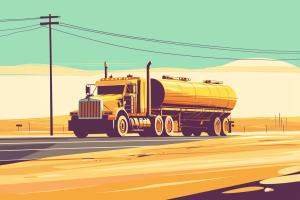The oil price impact on tank trucking has become a critical concern for the industry, affecting everything from fuel costs to shipment volumes. As global oil prices fluctuate, tank trucking companies are facing new challenges that require strategic responses to maintain profitability and efficiency.
- Uncover How Fluctuating Oil Prices Are Reshaping Tank Trucking: Dive into the direct impact of global oil price volatility on the operational costs and strategies within the tank trucking industry.
- From Fuel Costs to Fleet Innovations: Explore how companies are leveraging cutting-edge technologies and diversifying services to navigate through the challenges posed by the ever-changing oil market.
- Adaptive Strategies for an Uncertain Market: Discover the proactive measures tank trucking leaders are adopting to mitigate the impacts of unpredictable global oil prices on shipment volumes and fuel expenses.
Understanding the Oil Price Impact on Tank Trucking

Fuel fluctuations directly challenge tank trucking profitability and operational costs.
Global oil price fluctuations have a profound effect on the tank trucking industry. The reliance on fuel means that any change in oil prices can significantly alter operational costs and profitability. Moreover, these fluctuations influence shipment volumes as demand for oil and petroleum products varies with price changes.
How Global Oil Price Fluctuations Influence Fuel Costs
For more insights into how oil prices affect fuel costs, explore our dedicated page on Fuel Costs.
The Direct Effect of Oil Prices on Operational Expenses
Fuel expenses can account for up to 40% of a tank trucking company’s operating costs. When oil prices rise, the cost of diesel fuel increases, leading to higher expenses and reduced profit margins. For example, a surge in global oil prices can quickly translate to increased costs at the pump, putting immediate financial pressure on trucking operations.
Stay updated on the latest trends in the Oil & Gas industry and their influence on tank trucking by visiting this link.
Enjoying our insights?
Subscribe to our newsletter to keep up with the latest industry trends and developments.
Stay InformedWhat Operational Challenges Do Tank Trucking Companies Face?

Market awareness is crucial—staying informed enables proactive adjustments to fuel price changes.
Beyond fuel costs, oil price fluctuations lead to several operational challenges:
- Volatile Shipment Volumes: High oil prices can decrease demand for petroleum products, leading to reduced shipment volumes and lower revenue for tank trucking companies.
- Budgeting Difficulties: Unpredictable fuel costs make it challenging to forecast expenses and allocate resources effectively.
- Contract Negotiations: Fluctuating prices complicate long-term contracts with clients, especially regarding fuel surcharges and pricing agreements.
For additional insights into operational challenges and costs in the trucking sector, follow this link.
Strategies for Mitigating Fuel Price Volatility
Investing in Fuel-Efficient Technologies
How Can Fuel Efficiency Reduce Costs?

Adopting advanced engine technologies significantly cuts fuel consumption, pushing industry standards forward.
Adopting fuel-efficient technologies is a key strategy. This includes investing in newer, more efficient vehicles equipped with advanced engine technologies, aerodynamic designs, and telematics systems that optimize routing and driving behavior. Such investments can reduce fuel consumption by up to 15%, leading to significant cost savings over time.
To understand more about advances in fuel efficiency within the trucking industry, check out our Fuel Efficiency section.
Diversifying Services and Cargo
Should Companies Expand Beyond Petroleum Products?

Diversification in cargo types stabilizes revenue and mitigates risks tied to oil price volatility.
By diversifying the types of cargo transported—such as chemicals, food-grade liquids, or other bulk liquids—companies can reduce dependence on oil and petroleum shipments. This approach stabilizes revenue streams and mitigates risks associated with oil price volatility.
“Exploring alternative fuels and strengthening client relationships are pivotal strategies to adapt to the dynamic economic conditions affecting the tank trucking industry.“
Exploring Alternative Fuels
Some tank trucking companies are exploring alternative fuels like natural gas, biodiesel, or electric-powered trucks. While the infrastructure for these alternatives is still developing, early adoption can position companies as industry leaders in sustainability and offer long-term cost benefits.
Strengthening Client Relationships

Navigating the waves of oil price volatility requires innovative strategies and resilient operations.
Transparent communication with clients about fuel costs and implementing flexible pricing models help maintain strong business relationships. Fuel surcharge programs that adjust rates based on current fuel prices can manage expectations and maintain profitability.
Implementing Efficient Supply Chain Practices
Dive deeper into the impact of supply chain management by checking out this page.
How Can Operational Efficiency Mitigate Fuel Costs?
Optimizing supply chain operations includes:
- Route Optimization: Utilizing software to plan the most efficient routes reduces fuel consumption and delivery times.
- Load Consolidation: Maximizing cargo loads to reduce the number of trips needed.
- Preventive Maintenance: Regular vehicle maintenance ensures trucks operate at peak efficiency, reducing fuel wastage.
To learn more about tank transportation industry and strategies used, click here.
Monitoring Market Trends
Why Is Market Awareness Important?

Operational efficiency in tank trucking goes beyond cost-saving—it’s about optimizing for safety and reliability.
Staying informed about global oil market trends allows companies to anticipate changes and adjust strategies accordingly. By monitoring geopolitical events, economic indicators, and industry forecasts, companies can make proactive decisions to hedge against fuel price increases or capitalize on periods of lower prices.
Learn more about strategies for operational efficiency in the tank trucking industry here.
The Direct Relationship Between Oil Prices and Fuel Costs
Understanding the oil price impact on tank trucking is essential for industry stakeholders. The fluctuating nature of global oil prices presents both challenges and opportunities. By implementing strategic measures such as investing in fuel-efficient technologies, diversifying services, exploring alternative fuels, and optimizing supply chain practices, tank trucking companies can mitigate the adverse effects of oil price volatility. These strategies not only help maintain profitability but also position companies to thrive in a changing economic landscape.
Explore the broader implications for the Trucking Industry and how companies are adapting by visiting this link.
Navigating Turbulence: 7 Crucial Effects of Oil Price Fluctuations on Tank Trucking
- Fuel Price Sensitivity: Immediate impacts of rising or falling oil prices on the cost of operations, emphasizing the proportion of fuel expenses to total costs.
- Volume Variability: How changes in global oil prices affect the demand for tank trucking services, altering shipment volumes and scheduling.
- Operational Challenges: The complexities of budgeting and long-term planning in an environment of price uncertainty, affecting contract negotiations and financial forecasting.
- Technological Investments: The role of fuel-efficient technologies and advanced vehicle designs in reducing operational costs and enhancing environmental sustainability.
- Service Diversification: The strategic shift towards transporting a wider variety of cargo to reduce dependency on oil and petroleum product shipments.
- Alternative Fuels: Adoption of biodiesel, natural gas, and electric trucks as part of a broader strategy to hedge against fuel price volatility.
- Supply Chain Optimization: Implementing route optimization and load consolidation to maximize efficiency and reduce unnecessary fuel consumption.
Cheat Sheet: Understanding the Oil Price Impact on Tank Trucking
- Economic Implications
- Fuel Costs: Oil price changes directly affect diesel prices, influencing trucking operational costs significantly.
- Revenue Fluctuations: Higher oil prices can lead to decreased demand for transportation due to increased product costs, impacting revenue for tank trucking companies.
Strong client relationships anchor tank trucking companies during times of market instability.
- Operational Strategies
- Fuel Efficiency: Investing in fuel-efficient technologies and practices like aerodynamic enhancements, advanced engine solutions, and optimized routing to reduce fuel consumption.
- Diversification: Expanding service offerings beyond petroleum products to stabilize revenue, such as transporting chemicals, food-grade liquids, and other specialized cargoes.
- Alternative Fuels: Exploring the use of biodiesel, natural gas, and electric trucks to mitigate dependency on traditional fuel sources.
- Future Outlook
- Market Sensitivity: Continued sensitivity to global economic changes, geopolitical tensions, and environmental policies that influence oil prices.
- Technological Advancements: Adoption of new technologies including telematics for better route management and the increased use of alternative fuel vehicles.
- Regulatory Impact: Anticipate changes in environmental regulations that will affect operational practices and vehicle standards in the tank trucking industry.
- Key Metrics to Watch
- Oil Price Trends: Regular monitoring of global oil prices and market forecasts.
- Operational Costs Analysis: Keeping track of fuel costs as a percentage of total operating expenses.
- Fleet Efficiency Rates: Measuring improvements in fuel usage and efficiency across the fleet.
This cheat sheet serves as a quick reference to the essential aspects of how oil prices impact the tank trucking sector, providing a concise overview for stakeholders to understand key trends, strategic responses, and areas of focus for future resilience and profitability.
Comparative Impact of Oil Price Fluctuations: Tank Transportation vs. General Trucking
Fuel Cost Sensitivity
- Tank Transportation: Fuel costs are a critical factor due to the long distances and heavy loads associated with transporting liquids and gases. Fluctuations in oil prices have an amplified effect on operational costs, directly influencing the profitability of each route.
- General Trucking: While fuel costs also impact general trucking, the variety of cargoes and shorter route options can mitigate some of the volatility. General freight trucks can more readily switch routes or cargo types to optimize costs.
Operational Challenges
- Tank Transportation: This sector faces stringent regulatory compliance challenges, especially concerning safety and environmental protections due to the nature of the hazardous materials transported. This makes operational planning and execution more complex and sensitive to disruptions, including those caused by fuel price changes.
- General Trucking: Operational challenges in general trucking are more diverse but typically less regulated compared to tank transportation. Issues like vehicle maintenance and route optimization are common, but there are fewer restrictions on the types of goods transported, reducing some compliance burdens.
Every fluctuation in oil price is an opportunity for innovation in the tank trucking sector.
Technological Investments
- Tank Transportation: Investments in technology focus on improving safety, fuel efficiency, and compliance with environmental laws. Advanced technologies not only aid in reducing fuel consumption but also help in adhering to strict industry regulations.
- General Trucking: Technology investments are often aimed at improving general logistics, such as better GPS tracking, load management, and driver performance monitoring. While fuel efficiency is important, the focus can be more on cost-saving and increasing delivery speeds.
Market and Demand Fluctuations
- Tank Transportation: Demand for tank transportation is closely tied to the oil and gas industry, which is directly impacted by oil price volatility. This can lead to significant fluctuations in shipment volumes, requiring companies to be very responsive to market changes.
- General Trucking: The demand for general trucking services is influenced by broader economic factors and tends to be more stable. Market fluctuations affect general trucking less directly, allowing for more predictable planning and steady growth.
Sustainability and Alternative Fuels
- Tank Transportation: There is a growing push towards using alternative fuels like LNG or biodiesel in tank trucks to mitigate the environmental impact of transporting hazardous materials. This sector is also at the forefront of adopting electric vehicles to comply with strict emission standards.
- General Trucking: Sustainability efforts in general trucking also include the adoption of alternative fuels, but the motivations might be more for cost-effectiveness and less about compliance. The industry explores electric vehicles, but the adoption rate can be influenced by different factors, including cargo type and delivery range.
Further Reading on Oil Market Dynamics and Tank Trucking
- DNV 2024 Tanker Market Outlook: Understand future prospects for the tanker market with an emphasis on newbuilding challenges and decarbonization efforts at DNV’s Market Impact Report.
- McKinsey Global Oil Supply and Demand Snapshot: Explore comprehensive insights on global oil supply and demand dynamics from McKinsey at McKinsey’s Oil and Gas Blog.
- S&P Global 2024 Oil Market Issues: Delve into the top issues affecting global oil markets and mobility for 2024 provided by S&P Global at S&P Global Commodity Insights.
- IEA Oil 2024 Report: Gain insights into the forecasts and analysis of the oil market up to 2030 from the International Energy Agency at IEA’s Oil 2024 Analysis.
- IEA Oil Market Reports for 2024: Review detailed analyses of the oil market across several months in 2024 by visiting:
- World Economic Forum on Global Oil Prices: Understand the broader economic impact of oil prices globally at World Economic Forum Expert Analysis.
- IEA Executive Summary – Oil 2024: View the executive summary of the IEA’s comprehensive report on the oil industry at IEA’s Executive Summary of Oil 2024.























